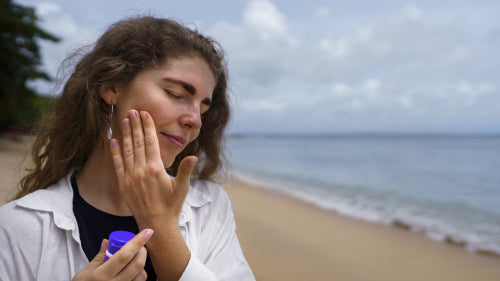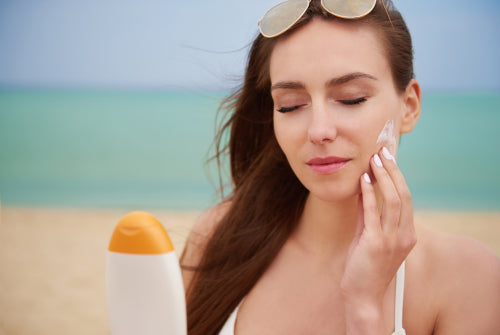Protecting Your Skin from Seasonal Allergies

Quick Listen:
Seasonal allergies, often triggered by pollen, dust, and other environmental changes, can have a profound impact on your skin. For many, the arrival of spring or fall brings not only the beauty of changing seasons but also the discomfort of itchy eyes, sneezing, and skin irritation. While allergies are commonly associated with respiratory symptoms, they can also lead to visible skin reactions, such as redness, dryness, and inflammation. Understanding how to protect your skin during allergy season is key to maintaining a healthy complexion and minimizing irritation. This article will explore how environmental allergens affect your skin and provide practical tips on skincare routines, protective products, and lifestyle changes to minimize allergic reactions.
How Seasonal Allergies Affect the Skin
Before diving into skin protection strategies, it's important to understand why allergens impact the skin. Pollen, dust, mold, and pet dander are some of the most common triggers for seasonal allergies. These allergens can affect the body in various ways, including causing inflammation in the skin, a condition known as allergic contact dermatitis. When allergens come into contact with the skin, they may trigger the release of histamines, leading to redness, itching, and irritation. These reactions are particularly common in individuals with sensitive or dry skin.
Additionally, seasonal changes can exacerbate skin conditions like eczema or rosacea. The fluctuation in temperature, humidity, and increased exposure to allergens can cause flare-ups, making it crucial to be proactive in your skincare routine.
The Impact of Pollen and Dust on the Skin
Pollen: During allergy season, pollen from trees, grasses, and flowers becomes a major trigger. While it's primarily known for causing respiratory issues, pollen can also settle on your skin, causing irritation. When pollen interacts with sensitive skin, it can lead to contact dermatitis or an allergic rash. Pollen can also irritate the eyes, leading to redness and swelling around the delicate skin of the eyes and eyelids.
Dust: Dust, often more prominent in the fall, can accumulate in your home and settle on your skin, causing inflammation. This is especially true for individuals who are allergic to dust mites, microscopic organisms found in household dust. Dust mites can trigger both respiratory symptoms and skin reactions, including redness, dryness, and flakiness.
Mold and Pet Dander: While not strictly seasonal, mold spores and pet dander can increase during certain times of the year. Mold thrives in humid environments, while pet dander can be exacerbated by changes in temperature and air quality. Both allergens can cause skin irritation and may make your skin more sensitive to other allergens.
Strategies for Protecting Your Skin During Allergy Season
While you can't control the weather or the presence of allergens, there are several proactive steps you can take to protect your skin and reduce allergic reactions. By making a few adjustments to your skincare routine and lifestyle, you can minimize the impact of allergens on your complexion.
1. Follow a Consistent Skincare Routine
A strong skincare routine is essential for maintaining skin health during allergy season. Consistency is key to preventing flare-ups and ensuring your skin remains hydrated and balanced.
Cleansing: Use a gentle, fragrance-free cleanser to remove allergens from the skin without stripping away essential moisture. Opt for a cleanser that suits your skin type, whether it's dry, oily, or sensitive. Cleansing your face regularly, especially after spending time outdoors, helps eliminate pollen, dust, and other irritants.
Moisturizing: Hydrated skin is less likely to experience dryness and irritation. Apply a lightweight, non-comedogenic moisturizer to lock in moisture. Look for products that contain soothing ingredients like aloe vera, ceramides, or hyaluronic acid. If your skin is particularly sensitive, avoid products with fragrances or alcohol, which can be drying and irritating.
Exfoliating: Regular exfoliation helps to remove dead skin cells and promotes healthy skin turnover. However, avoid harsh exfoliants, as they can make the skin more susceptible to irritation. Opt for a gentle exfoliator with mild acids (like alpha-hydroxy acids or beta-hydroxy acids) to keep your skin clear without causing damage.
Sunscreen: Sun exposure can further inflame allergic reactions, so it's essential to wear sunscreen daily. Choose a broad-spectrum sunscreen with SPF 30 or higher, and apply it generously to all exposed skin. Look for mineral sunscreens containing zinc oxide or titanium dioxide, as they are less likely to irritate sensitive skin.
2. Choose Products Designed for Sensitive Skin
Many skincare products on the market are formulated to help those with allergy-prone skin. Look for products labeled hypoallergenic, fragrance-free, and non-comedogenic, which are less likely to cause irritation. Here are some specific products to consider:
Antihistamine Creams: Over-the-counter antihistamine creams can help alleviate itching and inflammation caused by allergic reactions on the skin. These creams can provide quick relief when applied directly to the affected areas.
Soothing Serums and Masks: Look for calming serums or face masks containing ingredients like chamomile, calendula, or oat extract. These ingredients have anti-inflammatory properties that can help reduce redness and irritation.
Barrier Creams: If your skin is exposed to allergens, consider applying a protective barrier cream before going outside. These products form a thin layer over the skin to help prevent allergens from penetrating the skin.
3. Wash Your Face Frequently
During allergy season, allergens like pollen and dust can accumulate on your skin throughout the day. It's important to wash your face at least twice a day to remove these irritants. If you've been outside, rinse your face with cool water as soon as you come indoors. This helps to remove any pollen, dust, or other allergens that may have settled on your skin. Be sure to pat your face dry with a soft towel, as rubbing can irritate sensitive skin.
4. Create an Allergy-Free Environment at Home
While you can't control the outside environment, you can create an allergy-free sanctuary indoors. Keeping allergens out of your home is key to reducing skin irritation and respiratory symptoms.
Use an Air Purifier: Invest in a high-quality air purifier with a HEPA filter to remove pollen, dust, and pet dander from the air. This can significantly reduce your exposure to allergens indoors.
Keep Windows Closed: During peak pollen season, keep your windows closed to prevent allergens from entering your home. Use air conditioning to regulate the temperature and humidity, as this can help reduce mold growth.
Regular Cleaning: Vacuum your home regularly using a vacuum cleaner equipped with a HEPA filter to trap allergens. Wash your bedding, curtains, and upholstery frequently to remove dust and pet dander.
5. Protect Your Skin Outdoors
If you're spending time outside during allergy season, there are steps you can take to minimize your exposure to allergens:
Wear Protective Clothing: Consider wearing a wide-brimmed hat and sunglasses to protect your face and eyes from pollen. Long-sleeved shirts and pants can also help reduce the amount of skin exposed to allergens.
Shower After Outdoor Activities: After spending time outdoors, take a quick shower to wash off any allergens that may have settled on your skin and hair. This is especially important if you've been in a high-pollen area, such as a park or garden.
6. Stay Hydrated and Eat Skin-Boosting Foods
Proper hydration is essential for maintaining healthy skin. Drink plenty of water throughout the day to keep your skin hydrated and promote a healthy complexion. Additionally, incorporating skin-boosters skin-boosters foods like omega-3-rich fish, vitamin-rich fruits and vegetables, and foods high in antioxidants can help support your skin's natural defenses.
Protect Your Skin
Protecting your skin from seasonal allergies requires a combination of skincare routines, protective products, and lifestyle changes. By following the tips outlined in this article, you can minimize the impact of allergens on your skin, reduce irritation, and maintain a healthy complexion throughout allergy season. Remember that consistency is key, and taking proactive measures to care for your skin will help you enjoy the changing seasons without discomfort.
You may also be interested in: GET THE GLOW Desavery
Tired of putting harsh chemicals and synthetic ingredients in your skin? Discover the gentle, plant-powered, and cruelty-free skincare routine from Desavery. Meticulously crafted for every skin type, our day-and-night formulas nourish and revitalize, giving your skin a healthy, radiant glow. Join the community of those who've found a natural, effective solution for their skincare needs. Let your glowy skin tell a story of health and natural beauty. Shop Desavery Now!
Powered by flareAI



